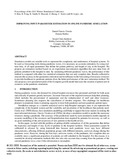Improving input parameter estimation in online pandemic simulation
Fecha
2021Versión
Tipo
Contribución a congreso / Biltzarrerako ekarpena
Versión
Versión publicada / Argitaratu den bertsioa
Identificador del proyecto
Impacto
|
|
10.1109/WSC52266.2021.9715311
Resumen
Simulation models are suitable tools to represent the complexity and randomness of hospital systems. To be used as forecasting tools during pandemic waves, it is necessary an accurate estimation, by using real-time data, of all input parameters that define the patient pathway and length of stay in the hospital. We propose an estimation method based on an expectation-maximization algorithm that us ...
[++]
Simulation models are suitable tools to represent the complexity and randomness of hospital systems. To be used as forecasting tools during pandemic waves, it is necessary an accurate estimation, by using real-time data, of all input parameters that define the patient pathway and length of stay in the hospital. We propose an estimation method based on an expectation-maximization algorithm that uses data from all patients admitted to the hospital to date. By simulating different pandemic waves, the performance of this method is compared with other two statistical estimators that use only complete data. Results collected to measure the accuracy in the parameters estimation and its influence in the forecasting of necessary resources to provide healthcare to pandemic patients show the better performance of the new estimation method. We also propose a new parameterization of the Gompertz growth model that eases the creation of patient arrival scenarios in the pandemic simulation. © 2021 IEEE. [--]
Materias
Data handling,
Expectation-maximisation algorithm,
Health care,
Hospitals,
Internet,
Parameter estimation
Editor
IEEE
Publicado en
2021 Winter Simulation Conference (WSC), 2021, pp. 1-12
Departamento
Universidad Pública de Navarra/Nafarroako Unibertsitate Publikoa. Institute of Smart Cities - ISC /
Universidad Pública de Navarra. Departamento de Estadística, Informática y Matemáticas /
Nafarroako Unibertsitate Publikoa. Estatistika, Informatika eta Matematika Saila
Versión del editor
Entidades Financiadoras
This paper was supported by the COVID grant of Navarre's Government 0011-3597-2020-000003 and the grant PID2020-114031RB-I00 (AEI, FEDER EU).






